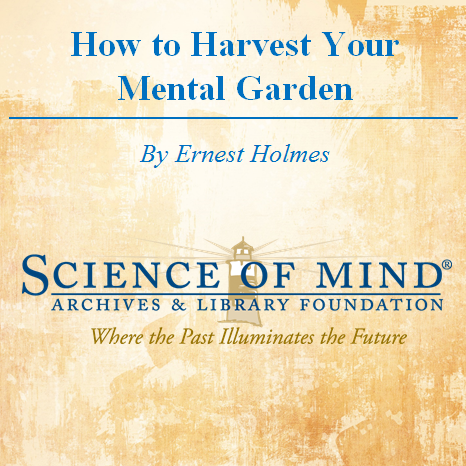Description
We have been talking about our physical gardens planted in the soil of the warm, rich earth that gives back an increase and we have likened this to the soil of the mind in which are planted the seeds of thoughts and ideas, the seed of the earth and the seed of a thought; the harvesting of the abundance of nature and the harvesting of our thoughts and feelings. We have learned that the soil of the mind, like the earth, must first be prepared if we wish This Thing Called Life, the Power greater than we are, to give us the desired harvest.
We have tried to plant in love and to cultivate our gardens with expectant enthusiasm. We have tried to be happy gardeners and to plant our seeds in faith. Love, happiness and faith are the three most fundamental things in life. We have discussed how it is that seeds of thought planted in the soil of the mind will produce a harvest exactly like the seed because we are dealing with a law in nature. We have also considered another important thought, that when we plant seeds we must let them alone; we must not pull them up or expose their roots to the sun lest they wither and die.
And we have come to realize that there is no difference between sowing ideas in the mind and sowing seed in the soil, for the same law works in both instances. We are surrounded by an infinite Mind which receives the impress of our thought and acts upon it, creatively.
This is the simple key to the whole situation. This is why Jesus said, “It is done unto you as you believe.” We have overlooked this simple thought – it is done unto you, which means that there is a Power greater than we are in which we live, which like a mirror, reflects back to us those things we have pictured in our inward thought.
I like to think of this garden of the mind, this deep, rich spiritual soil which Life has given us to cultivate. I like to realize that nothing can rob us of this garden, for we have the privilege and the joy of cultivating it and watching it grow as faith takes form and gives back to us the harvest of our fondest hope.
We have learned how necessary it is to guard against fear; how we must cultivate the assurance of faith and hope. I think we have done very well so far. And now let’s come to the harvest. And in this harvest we should expect that every seed will have multiplied, providing seeds for another planting and another harvest, for this is one of the rewards of gardening the bountiful increase of nature.
Plant one little melon seed and it will give you a vine and a fruitage that multiplies your endeavor a hundred times. You will have seed enough to set out a much larger patch in a new season and an abundance left over to give your neighbors. How wonderful is this gift of Life! And how extravagant the increase of good! Did not the Great Teacher say, “Give, and it shall be given unto you; good measure, pressed down, and shaken together, and running over, shall men give into your bosom?” The final act of the Harvest is one of gratefulness and thanksgiving . . . thankfulness to the great principle of life for the completed cycle, and the fulfillment of our desires.
I would like to tell you how this worked in the life of a music teacher I once knew. She taught piano but wasn’t able to get many pupils. In analyzing the creative soil of her mind, I discovered that about all she had planted there were thoughts of doubt and failure. Way down inside her she really didn’t expect pupils. I asked her why. Her main reason seemed to be that she had no influential friends and there were so many others in the same profession; there was too much competition and she never seemed to meet the right people.
So we had to pull up a lot of weeds and get rid of some devil-grass, and plant some seeds of hope and expectancy. Since she was rather depressed, we had to uproot anxiety and plant faith and confidence. In actual practice, I told her to expect pupils, to daily affirm that whoever could be benefited by her services would be brought to her by the Law of Good. I explained to her that there is but one Mind, God’s Mind; that this Mind is present everywhere, and that it would be easy enough for it to bring her more pupils than she could possibly have time to teach.

